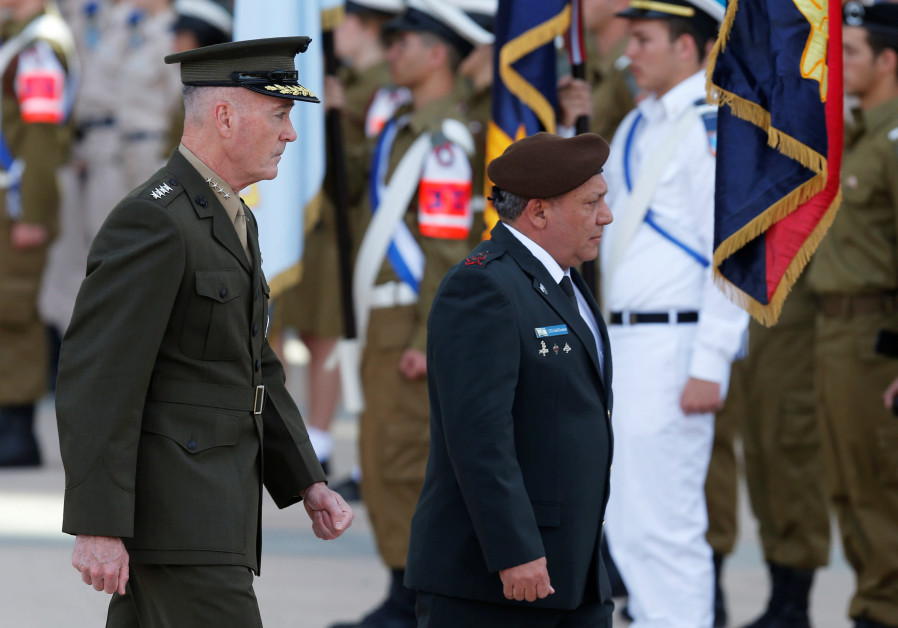What message from Lebanon did Eisenkot get in DC?

General Joseph Dunford (L), the Chairman of the U.S. Joint Chiefs of Staff, walks next to Israel’s Chief of Staff Lieutenant-General Gadi Eizenkot, as they review an honour guard in Tel Aviv, Israel May 9, 2017.. (photo credit: NIR ELIAS / REUTERS)
IDF Chief of Staff Lt.-Gen. Gadi Eisenkot visited Washington over the weekend and met with chairman of the Joint Chiefs of Staff Gen. Joseph Dunford for talks about the Middle East.
What was not published was that just a few days earlier Dunford had met with Lebanese Armed Forces commander Lt. Gen. Joseph Aoun for similar talks at the Pentagon.
According to the IDF, Eisenkot held working meetings with senior security and military officials in Washington to “discuss aspects of military cooperation in light of the significant security challenges in the Middle East and other issues.”
A Pentagon readout of the Eisenkot-Dunford meeting on Friday said that the “two leaders continued their ongoing conversation on several issues of mutual concern including Iran’s malign activities in the region and the broader regional security situation. The US and Israel enjoy a strong military- to-military relationship as key partners committed to peace and security in the Middle East region.”
What the IDF did not mention though is that just three days earlier, Dunford sat down for a similar meeting with Aoun who was on his third trip to Washington since assuming his position in the spring of 2017.
According to the Pentagon, the “two leaders discussed challenges and security concerns in the region, including combating terrorism. They also discussed continued US-Lebanese military cooperation. The partnership between the United States and Lebanon is a crucial element to peace and security in the Middle East region.”
Earlier this month, House Foreign Affairs Committee’s Terrorism, Nonproliferation and Trade Subcommittee held a hearing on the Trump administration’s arms sales to various countries including Lebanon.
The United States has provided some $1.7 billion worth of military equipment to the Lebanese Armed Forces since 2006 to bolster the Middle Eastern country from the threats posed by terrorist groups.
In December, US Ambassador to Lebanon Elizabeth Richard stated that the US will supply $120 million worth of new systems to the LAF, including six new MD-530G light attack helicopters, six new Scan Eagle unmanned aerial vehicles, and leading-edge communication and night vision devices.
In early June, four A-29 Super Tucano light attack aircraft were formally handed over to Lebanon by the US, completing an order of six planes two months ahead of schedule.
The Departments of State and Defense also work closely with the LAF to support the provision of training and equipment, including fixed and rotary-wing aircraft, vehicles, arms, and munitions.
Some 120 US military personnel are also deployed to Lebanon, at the request of the Lebanese government, in order to enhance Beirut’s counterterrorism capabilities.
According to Defense News, Congressman Ted Poe, the subcommittee chairman, asked Pentagon and State Department officials for assurances that US arms sold to Lebanon were not making their way into Hezbollah hands.
“We watch extremely carefully, and we are confident thus far that no weapons have been transferred from the Lebanese government or armed forces into the hands of those who should not get them, including Hezbollah,” said Tina Kaidanow, acting assistant secretary of state for political-military affairs.
Israel and Hezbollah fought a deadly 33-day war in 2006, which came to an end under UN Security Council Resolution 1701 which called for disarmament of Hezbollah, for withdrawal of the Israeli army from Lebanon, for the deployment of the Lebanese army and an enlarged UN force in the south.
But, Hezbollah’s influence in Lebanon is nothing new and last October Defense Minister Avigdor Liberman warned that Lebanon’s army has “lost its independence and has become an integral part of Hezbollah’s network,” stating that the next war on Israel’s northern border will not be confined to one front but will see conflict with both Syria and Lebanon.
According to IDF assessments, Hezbollah has increased its military capabilities due to its fighting in Syria, and has spread its troops across the entire Middle East. In addition to a massive arsenal of rockets and missiles, Hezbollah is able to mobilize close to 30,000 fighters and has flouted its tunnel system, complete with ventilation, electricity, and rocket launchers.
Some 200 villages in south Lebanon have also been turned into “military strongholds” from where Hezbollah terrorists are able to watch Israeli soldiers at any moment.






Comments are closed.